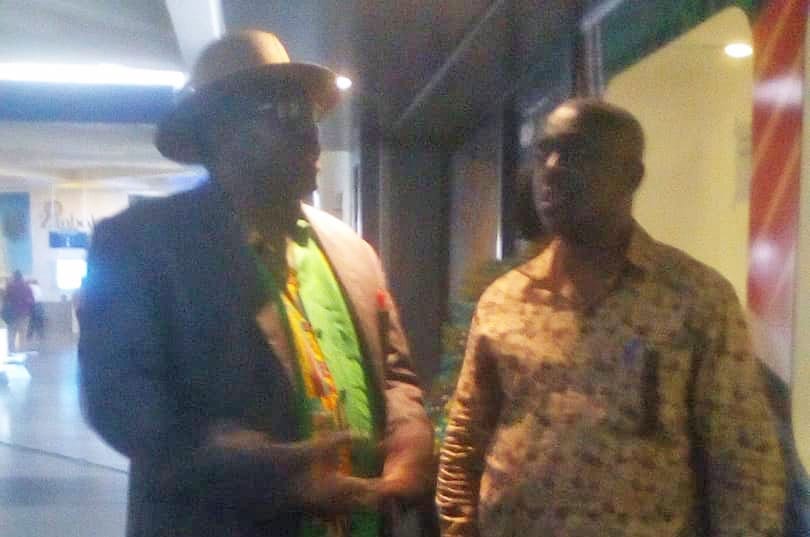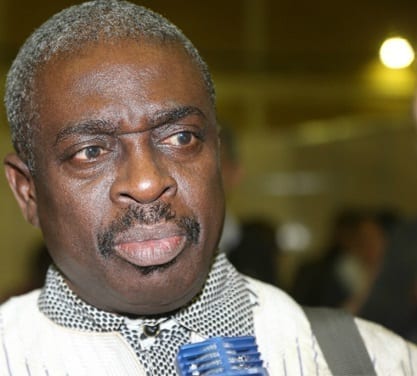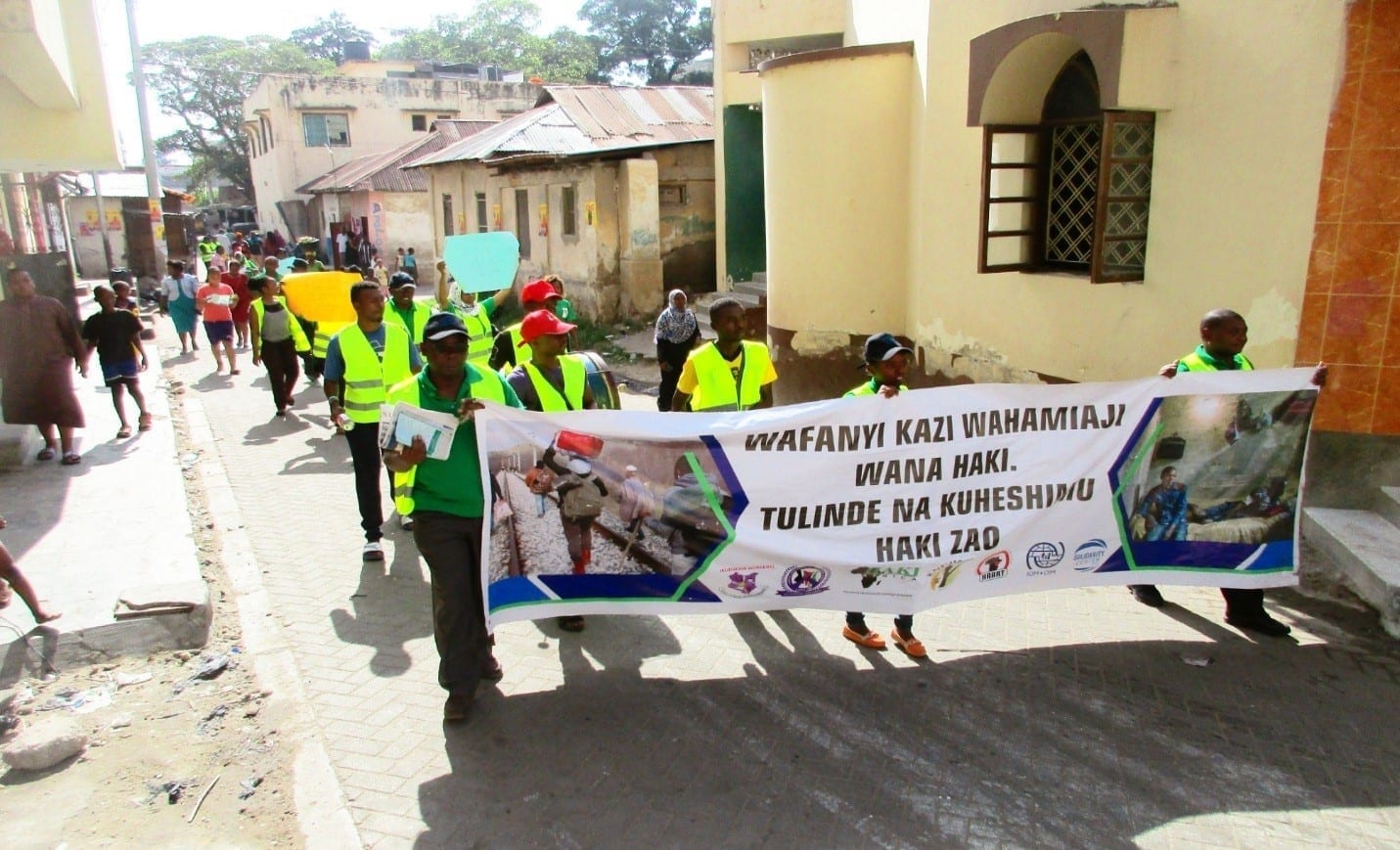
Feb 26, 2019
Hours after state security agents forcibly removed and detained ITUC-Africa Secretary General Kwasi Adu Amankwah in Harare, Zimbabwe, Amankwah was released and allowed to continue his official visit, according to the Zimbabwe Congress of Trade Unions (ZCTU).
State security agents took Amankwah to Robert Mugabe International Airport in the early morning hours today where he was held for nearly 12 hours without access to a lawyer. Global condemnation over the action and the intervention of ZCTU legal team resulted in his release, says ZCTU. Union leaders confirm he was not injured while in detention, but say he was never given a reason for his detention.
Amankwah was set to meet with ZCTU leaders and representatives of the International Labor Organization (ILO) and employer groups and had just arrived at his hotel when state security showed up. Other ITUC representatives from Brussels who sought to travel to Zimbabwe with Amankwah were denied visas.
Among those condemning Amankwah’s detention are the three largest trade unions in Africa: the Central Organization of Trade Unions-Kenya (COTU-Kenya), the Congress of South African Trade Unions (COSATU) and the Nigerian Labor Congress.
The regionwide union organization, the Southern Africa Trade Union Coordination Council (SATUCC), also condemned the action and strongly urged the government “to stop interfering in trade union work and criminalizing trade union activities and actions.”
Amankwah’s detention follows protests by thousands of Zimbabweans over a 150 percent fuel price hike and the arrest and release of ZCTU Secretary General Japhet Moyo, President Peter Mutasa and dozens of others who now are restricted from travel and must check in with police.
In a statement, ZCTU calls on the government to “prioritize dialogue instead of resorting to cowardly intimidatory tactics where it feels there are discrepancies.”

Feb 26, 2019
Kwasi Adu Amankwah, general secretary of the African Regional Organization of the International Trade Union Confederation (ITUC-Africa), was forcibly taken from his hotel at 2 a.m. today in Harare, Zimbabwe, where he had just arrived.
Amankwah was set to meet with leaders of the Zimbabwe Trade Union Confederation (ZCTU) when state security agents took him to Robert Mugabe International Airport, where he has been held for hours.
Officials refused to allow a lawyer from ZCTU to see Amankwah at the airport, according to ZCTU.
“It’s a sad development,” ZCTU President Peter Mutasa told the media. “We are in trouble as human rights defenders and trade unionists.”
Other ITUC representatives from Brussels who sought to travel to Zimbabwe with Amankwah were denied visas.
In addition to the solidarity visit to ZCTU, Amankwah was scheduled to meet with the Zimbabwe Ministry of Labor and representatives of the International Labor Organization (ILO) and employers’ federation. Amankwah has not been charged nor informed of the reason for his detention, according to ZCTU.
“It is not clear why such a senior trade union leader was detained at his hotel in the early morning hours and whisked away to the airport without his belongings—and even denied food brought to him by his lawyer and trade union colleagues as he was detained at the airport,” says Solidarity Center Africa Region Director Hanad Mohamud. “This after lawfully entering Zimbabwe. Why is Kwasi being targeted like this?”
In January, after tens of thousands of Zimbabweans protested a 150 percent fuel price hike, ZCTU Secretary General Japhet Moyo and Mutasa were arrested on charges of subversion and beaten in detention. They since have been released but are restricted from travel and must check in with police.
The January crackdown on worker rights’ activists follows the arrest and release of Moyo, Mutasa and 33 other union leaders in October, as government officials attempted to end a nationwide protest against a financial tax increase and rising prices. Some union activists were beaten, ZCTU Harare offices were cordoned off by more than 100 police, and ZCTU leaders not already in jail were forced into hiding.
In a letter to Zimbabwe President Emmerson Mnangagwa, ITUC-Africa asks for Amankwah’s release and “an unreserved apology for this action” from the Zimbabwe Department of Immigration.
The Congress of South African Trade Unions (COSATU) is among unions around the world decrying Amankwah’s detention and likely deportation, condemning the move “in the strongest terms” and demanding his immediate release and freedom to meet with ZCTU and others.

Feb 21, 2019
The Central Organization of Trade Unions-Kenya (COTU-K) and the Kuwait Trade Union Federation (KTUF) signed a cooperative agreement last week in Kuwait City, formalizing the federations’ effort to jointly address issues affecting workers who migrate from Kenya to Kuwait for employment.
“It is crucial to bring together unions from countries on both ends of the migration spectrum to promote a deeper understanding of the challenges workers face along their journey and into the workplace,” said Solidarity Center Director of Middle East and North Africa Programs Hind Cherrouk. “This agreement, which affirms the rights of migrant workers from Kenya in Kuwait, is an important step forward in that regard.”
Millions of migrant workers are trapped in conditions of forced labor and human trafficking around the world, in part as a result of being lied to by labor brokers about the wages and working conditions they should expect. Of the estimated 150 million migrant workers globally, some 67 million labor as domestic workers—83 percent of whom are women—often in isolation and at risk of exploitation and abuse.
The majority of some 34 million Africans are migrants move across borders in search of decent work—jobs that pay a living wage, offer safe working conditions and fair treatment. Often they find employers who seek to exploit them—refusing to pay their wages, forcing them to work long hours for little or no pay, and even physically abusing them. Kenyan women signing on for domestic work in Saudi Arabia, for example, were told they would receive 23,000 Kenya shillings ($221) a month, only to find upon their arrival that the pay was significantly less and the working and living conditions inhumane. Through the Kenya Union of Domestic, Hotel, Educational Institutions, Hospitals and Allied Workers (KUDHEIHA), COTU-K is supporting a multi-year effort to protect domestic workers migrating from the coastal area surrounding the city of Mombasa to homes in the Middle East.
Unions around the globe are increasingly taking joint action to create community and workplace-based safe migration and counter-trafficking strategies that emphasize prevention, protection and the rule of law. KTUF spearheaded a groundbreaking 2015 domestic worker law that granted enforceable legal rights to 660,000 mostly migrant workers from Asia and Africa working in Kuwait as domestic workers, nannies, cooks and drivers, and urged further protection for migrant workers in Kuwait and other Gulf countries. That same year, unions in Asia and the Gulf signed a landmark memorandum of understanding (MOU) that promoted and outlined steps for coordination among unions in organizing and supporting migrant workers in those regions. The Solidarity Center and its partners in the Americas in 2017 crafted a worker rights agenda for inclusion in the United Nations Global Compact on Safe, Regular and Orderly Migration.
“There is a potentially powerful role for union-to-union, cross-national and, in this case, cross-regional solidarity in protecting the dignity of migrant workers traveling from Africa to the Middle East. The Solidarity Center is proud to be a partner in this process and trade union-centered approach between the trade union movements of Kuwait and Kenya,” said Solidarity Center Director of Africa Programs, Hanad Mohamud.

Feb 19, 2019
Jordan’s Senate is set to consider amendments to the country’s labor code that will restrict worker’ fundamental rights to freedom of association and collective bargaining and that fail to address Jordan’s longstanding limitations on worker rights, according to the International Trade Union Confederation (ITUC), which is joined by global unions in condemning the proposal and urging legislators to withdraw it.
The amendments, passed in recent weeks by the country’s House of Representatives, increase restrictions on freedom of association by requiring the Ministry of Labor to approve union bylaws when they register with the government. The amendments also give the Labor Ministry the authority to dissolve unions and impose fines and imprisonment for those who continue union activities for a dissolved union.
(Tell the Jordan government to bring the country’s labor laws in line with international standards.)
Since 1976, no new trade union has been allowed to form in Jordan, which also prohibits migrant workers—who comprise a large portion of the Jordanian workforce—from forming unions. Jordan labor laws also permit unions in only 17 sectors set by the government, and only one union per sector is allowed to represent workers. Most recently, the government rejected the registration of an independent union in the agriculture sector because agriculture is not on the government’s list.
The International Labor Organization (ILO), which also sent Jordan’s minister a memo detailing the amendments’ violations of international labor law, has repeatedly pointed out Jordan’s failure abide by ILO conventions on freedom of association and collective bargaining.
Independent unions in Jordan are also pushing back on the proposed amendments, with workers protesting at parliament and union leaders writing open letters to the government urging lawmakers follow international labor standards.
Read the Jordan Federation of Independent Trade Unions press release and letter (Arabic) and the Jordanian Network for Human Rights letter (Arabic).

Feb 14, 2019
The Congress of South African Trade Unions (COSATU) launched a general strike across eight provinces Wednesday as a warning to South Africa’s governing party, the African National Congress (ANC), to address rampant job losses and unemployment across the public and private sectors.
“We are tired of economic growth that does not create employment opportunities, that increases inequality, ignores and undermines cultural identities, and that squanders resources needed for future generations,” COSATU said, in a press statement.
Although the country’s official unemployment rate dropped 2 percent in the last quarter of 2018, to 27.1 percent, South Africa’s real employment rate is 38 percent. South Africa has one of the highest unemployment rates among similarly economically developed countries. Some 10 million people are jobless and more than 17 million are on welfare.
Later this month, workers in the Western Cape province will mobilize to pressure Finance Minister Tito Mboweni to include labor’s views on downsizing in the budget speech he will deliver in Cape Town on February 20.
After failing to convince government to declare a moratorium on downsizing workers, COSATU hopes its strike will slow the shedding of more jobs from the health care sector and South Africa’s state-owned enterprises—including energy company ESKOM, where retrenchments last year began without consultation with the National Union of Metalworkers of South Africa (NUMSA).
“[S]ince 2012, government gave the private sector corporate tax breaks,” said COSATU spokesperson Sizwe Pamla in an interview with SABC News. “Now we were saying to them, don’t you think it’s fair… to put a moratorium?”
The strike is supported by all major COSATU-affiliated unions, including the Democratic Nursing Organization of SA (Denosa), the South African Democratic Teachers` Union (SADTU), the South African Municipal Workers` Union (SAMWU), the South African Transport and Allied Workers` Union (SATAWU), the Communication Workers Union (CWU), the Police and Prisons Civil Rights Union (POPCRU) and the South African Commercial, Catering and Allied Workers Union (SACCAWU).
COSATU, with more than 1.5 million members, is a Solidarity Center ally in South Africa. As the strongest voice in civil society, the South African labor movement enables workers to join together for better wages, pro-worker economic policies and increased standards of living.





